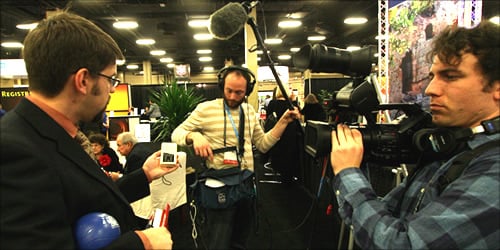On Campus News
| Ohio University School of Film: Dedicated to Providing an Educational Environment of Creativity, Diversity and Excellence By Megan Harr posted Mar 12, 2013, 21:00 |
 |
| The streets of Athens, Ohio become heavily populated with students from Ohio University, offering as much off campus as on. Photo courtsey of Ohio University. |
A rural and historic town located along the Hocking River in southeastern Ohio, Athens is home to Ohio University whose collective
student body nearly outnumbers the population of the town itself. But its relatively small size does not mean that the Ohio University
School of Film does not provide its students with the educational tools that they need to become successful filmmakers later in life.
The Ohio University School of Film is dedicated to providing an educational environment of creativity, diversity and excellence in
which talented and disciplined students can examine and develop the art and craft of the motion picture as an art form, educational
tool and a dynamic cultural force in the 21st Century. The School of Film offers two graduate degree programs an M.F.A. for those
looking for advanced training in directing, screenwriting, producing, cinematography, and motion picture sound with a solid background
in addition to an M.A program which focuses on film criticism, film history, and analysis.
 |
| Students at Ohio University School of Film get to participate in hands on work alongside peers, faculty, and experts in the field. Photo courtsey of Ohio University. |
Steven Ross, director of the School of Film at Ohio University, has been a cinematographer and filmmaker for more than 30 years. Ross
shares his experience with us and gives us a closer look at what the Ohio University School of Film has to offer prospective students.
What sets the Ohio University School of Film apart from other film schools?
Steven Ross: We are primarily a graduate program so we don�t offer an undergraduate degree program. We have a small, fantastic faculty.
Although we are not in an epicenter we pride ourselves on creating the total filmmaker whereas other schools track students into
screenwriting, directing, or filmmaking. Because students have to rely on each other to fill all crew positions, we attempt to teach
and provide experience in all aspects. In the first year students have a "boot-camp" where all of the students march in step from class
to class. Meaning that they follow an integrated curriculum that covers technical skills like cinematography, sound recording, and
post-production. You don�t have to go to film school to learn technical skills, but they are the tools of the trade and are needed for
you to be successful in our program. We also offer craft classes (screenwriting, directing, acting). These interrelated courses provide
a foundation for students and cover all of the bases. We create an all purpose filmmaker. Most students go forward as writers or
directors but they are adept in other aspects of the filmmaking process as well. Another thing that separates us is that we�re lucky
enough to offer financial aid packages to almost everyone who comes here. Bigger schools don�t necessarily have the ability to do that.
They are really expensive and we�re able to provide financial aid packages which help those who really can�t afford the costs of the
NYU�s, USC�s, and Columbia�s. We also have a large percentage of international students (30%) and students from other fields.
By the way, congratulations on your new re-vamped website (www.ohio.edu/finearts/film). What are some new things happening at Ohio
University's School of Film?
Steven Ross: The biggest change is that after 50 years in Lindley Hall we have moved into a brand new building which is right across
the street from the Athena Cinema in the heart of downtown bustling Athens, Ohio. Being in a new space is exciting and we�re putting
finishing touches on a sound and new state of the art screening room. We received a new grant to bring 3D to the OU School of Film
which will be phased in next year. Other than that our students are doing what they typically do working to be the best that they can
be.
What are some of the important learning goals and objectives for key courses (or new courses, if you have some new courses)?
Steven Ross: We provide teaching skills that are marketable. Our students go to NY and LA and all over the country and they are
comfortable and able to walk on to film sets or into post production facilities and feel fairly comfortable. When our students leave
school we know that they will have to invent their lives and start on a new and exciting career. We provide the space for filmmakers to
find their voice and be creative. Here, students develop a creative portfolio that they can be proud of. Because the school is so small
there is a lot of one on one interactive time, dealing with screenplays or production plans or career. Our faculty acts as a good
sounding board for students looking to start careers within the film industry.
What kinds of tips could you give students for creating a successful application for "Ohio University, College of Fine Arts, School
of Film"?
Steven Ross: I want to see a creative portfolio that shows quality not quantity. I�d much prefer to see complete works not clip reels.
Something that we take very seriously is the personal statement. This is the one chance that applicants have to tell us who they are
and why they want to be here. It�s the last chance we get to know them before we start reducing the pile of applications. Subsequently
we have phone interviews. Basically, I�d like to see very personalized applications. I want to see what your ideas are and understand
whether or not you have a talent and a passion for this craft. Those applicants with filmmaking experience probably have some
advantages. However, we do have very successful students who have backgrounds in the sister arts of theater, photography, etc. that
have put together wonderful applications. But if you do not have any inclination or any background in creative arts, your application
and subsequent acceptance may be a long shot.
Similarly to Ross, Annie Howell, Assistant Professor at Ohio University School of Film, has been successful in the filmmaking industry.
Howell recently co-directed (with Lisa Robinson) her first feature, SMALL, BEAUTIFULLY MOVING PARTS, which premiered at SXSW and was
released theatrically in several cities nation-wide. Howell teaches what she calls "the blandly named Filmmaking I and Filmmaking II,"
but states that the work she does helps shepherd first year graduate students through three projects, designed to develop primary
writing and directing skills. Many Ohio University students relocate to New York or Los Angeles after graduation, and Howell believes
there is a real opportunity in a more intimate learning environment before making that jump. "It�s important to me that students
develop the confidence to be an artist. Athens is a great place to help that process along." Howell guides each student to develop his
or her own "tool set" of aesthetic methodologies, as opposed to conform to one particular type of filmmaking. "We want students to take
risks here, and they do. That makes for a very exciting movie-making environment."
Click here for more information about Ohio University School of Film.